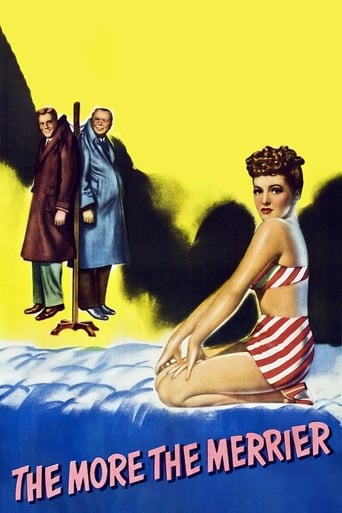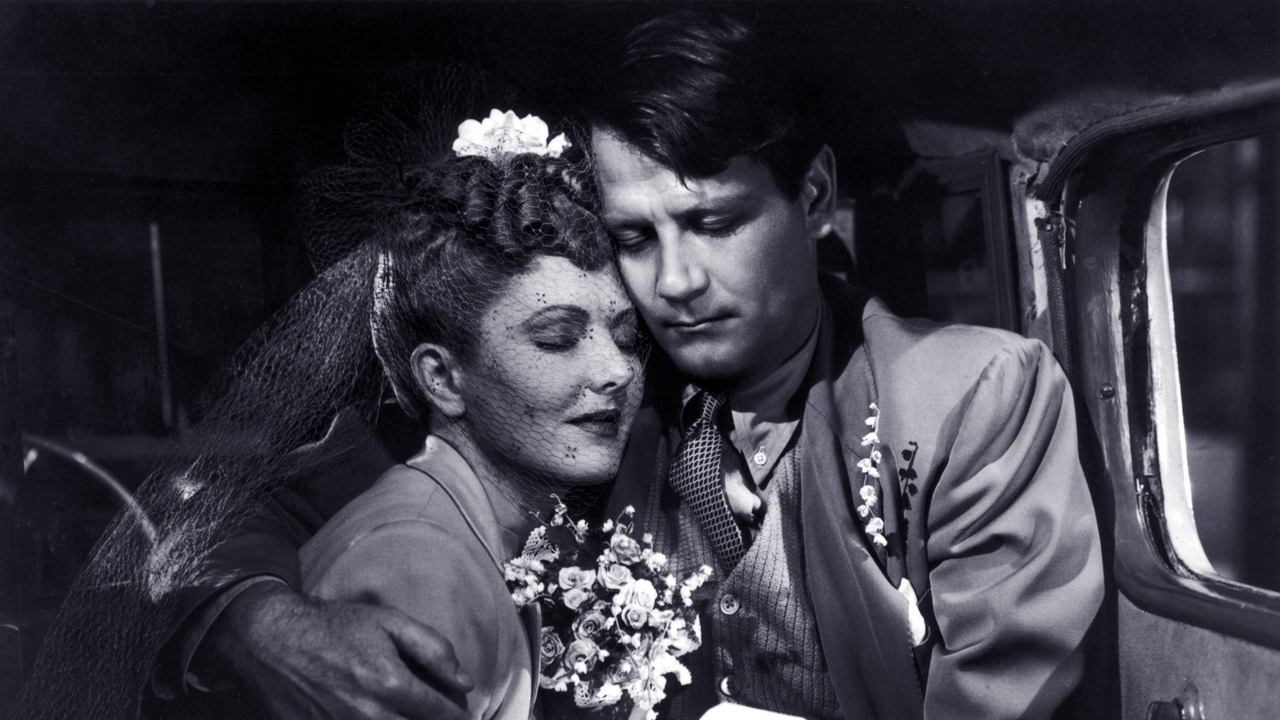Antonius Block
I've fallen in love with Jean Arthur. She is funny, cute, romantic, and utterly charming in this film. Her hair and outfits are exquisite. The way she moves her body is so endearing, in everything from getting out of a car, to skipping around her apartment in madcap moments, to dancing. I love the little squeak in her voice and the fact that she was 43 when this film was made. Her reaction to being kissed on the neck on the steps outside, my god. What an incredibly steamy scene. Oh yeah, and Joel McCrea was great too. :) He plays his part with a perfect touch, drawing on the seriousness of wartime, goofing around with Charles Coburn, and unable to stop a growing attraction to Arthur, but at the same time, with a degree of understatement and reserve. He's a gentleman, but damn, those hands and his moves in that scene on the steps. Did I mention that scene? Another great one is when he gives her a fancy travel bag and then shows her all of its various features - they are both just so natural, and one feels their interest in each other simmering in their terrible nearness. He accidentally marks his nose sniffing a makeup container, and it was quite clever of director George Stevens to leave it on his face for as long as he did. I also loved when they both secretly hoped her fiancé (Richard Gaines) wouldn't call by 8 pm, so that they could go out together instead.Charles Coburn is quite a character in this film as well, impish and bold, while cleverly playing matchmaker between the two. The banter between Coburn and McCrea is as good as the banter each have with Arthur. Coburn's performance was worthy of the best supporting actor Oscar he won. Stevens has a great sense of flow, balances the comedic and romantic elements perfectly, and gives us lots of little eye candy on top of it. The wartime song at the end was a nice touch too. Highly recommended.
weezeralfalfa
This superior romantic comedy features Charles Coburn and Joel McCrea as short-stay transients in wartime Washington, D.C., looking for a place to bed down for about a week. Jean Arthur is a working resident looking for a roommate to help pay the rent , while doing a bit to relieve the severe housing shortage in the nation's capital, due to the influx of people to work in the offices and plants relating to the war. Joan put an ad in the paper, but failed to specify that she was looking for a female. Hence, she was shocked when Coburn showed up, having tricked the many other hopefuls into believing the position was taken. At first, Jean was adamant that she would not tolerate a man as a roommate, even an old grandfatherly-looking one. But Coburn blustered and bullied his way in to her spare room. He would soon get an earful of her mandatory wakeup routine, from 7 to 7.30, each morning. One of the comedic highlights of the film has Coburn trying to conform to her schedule......While Jean is at work, Coburn takes it upon himself to sublet half of his room to another street wander: McCrea. Some humor results from McCrea getting used to his new abode. Again, Jean is shocked that she has an additional male roommate, even if only for perhaps a week......In the morning, Coburn talks to a committee about the need for new housing, even if just temporary. Later, Coburn finds and reads the last part of Jean's diary, especially, her first impressions of McCrea. When she catches him reading, she goes through the roof, then goes to her room, and cries. She orders them to leave by morning. Coburn has a pre-arranged hotel room, so he's not too disturbed, but McCrea has only another 2 days before he leaves for Africa. Thus, she relents and allows him to stay those days. Well, as you can guess, romance eventually enters the picture. But there's a problem: Jean is engaged to a Mr. Pendergast. See the film to find out how things turn out......The most fun part of the film is the first part, where Coburn and Jean much interact. But, the last part isn't excessively dull. only in comparison....See it on YouTube
SimonJack
"The More the Merrier" is set in Washington, D.C. smack dab in the middle of World War II. The housing shortage of the time and place sets up the plot for this wonderfully funny movie. Jean Arthur is Connie Milligan who does her patriotic duty by advertising to share her apartment. Charles Coburn is Benjamin Dingle, a businessman who arrives in the city two days early for some government business and finds no hotel space. He weasels his way past a long line of people waiting to see Connie about her apartment, and convinces her to accept him. While Connie's off to work the next day, Dingle rents half of his half of the apartment to a young man, Joe Carter, played by Joel McCrea. One can guess where this story will go as Dingle plays cupid and matchmaker for Connie and Joe. But the humor is over the top funny as the trio go from situation to situation. There are scenes with little or no dialog that resemble slapstick one would see from the Three Stooges or Laurel and Hardy or Abbott and Costello. A small supporting cast contributes to the fun, but this film is mostly a three-person show. While Connie and Joe are excellent in their roles, it is Coburn's Dingle who is the heart of the comedy.Coburn has never been funnier. This second lead and top supporting actor didn't arrive in Hollywood until he was 56. But over the next nearly three decades he made almost 100 movies. He played dramatic roles, in historical and biopic films, and others; but his forte was comedy. In most instances he was a straight man, or a stern character with clever repartee. Never was he funnier than in this film. And, I can't recall any scenes in his many films in which he smiled, but he gives a huge ear-to-ear grin in this film. Coburn was most deserving of the Oscar he won as best supporting actor in "The More the Merrier." This was the first Columbia movie to be held over by theaters across the nation. It was an obvious hit with audiences in 1943, and it should continue to delight people of all ages these many decades later. Besides the comedy of the three leads, this film gives a glimpse of life in the American capitol during WW II. That is, a glimpse of the social life. Washington then was known for its ratio of eight women to one man. The film scores that point with a little humor as well with a couple of scenes. In one, a line of women whistle and gawk at a man who walks by. And in a restaurant scene with Connie and Joe, some women are dancing together, and when Connie goes to powder her nose, Joe is immediately surrounded by a bevy of beauties. It may be hard to imagine a sudden huge housing shortage in any city today. But the situation in Washington, D.C. was very real during WW II. Two factors contributed to it. The number of government employees increased dramatically to staff the many new offices and jobs related to the war. And, droves of single women were arriving to replace men who left every kind of job imaginable to go off to war. The families of the men who went off to war were still there in their homes. So, new housing had to be found for those moving into the area. The Good Housekeeping magazine issue of January 1942 had a feature article about the "government girls." The article said, "There's a new army on the Potomac – the bright-eyed, fresh-faced young Americans who have poured into Washington from remote farms, sleepy little towns, and the confusion of cities, to work for the government in a time of national emergency."The article noted that these young women went to work in crowded federal buildings, instant offices created in warehouses, apartment buildings and wartime temporary office buildings tossed up on the Washington Mall. Besides the mushrooming numbers of office jobs for women that the war brought, women replaced men in the local service garages, in the utilities jobs, pumping gas, driving trucks, delivering mail, etc.Those who have lived near or visited the U.S. Capitol know how beautiful the Washington Mall is. Just imagine that toward the end of WW II, more than two-thirds of the Mall was occupied with office buildings. Temporary structures filled the mall along Constitution and Independence avenues. And, the park below the West side of the capitol building was filled with buildings. Only the narrow strip with the Washington Monument and reflecting pool remained open and one could see the narrow park strip from the Capitol west to the Lincoln Memorial. After the war, some of the temporary buildings remained for decades. Some were still there when I worked in the nation's capital in the 1970s. I think the last of the temp buildings were torn down by about 1980. Of course, more permanent buildings had been built over the years to house the larger government that continued to grow even after the war years.
Scott44
I recommend dakota_linda ("Delightful if not quite perfect", dakota_linda from United States, 14 June 2009) and denscul ("A really funny 'war' movie about the housing shortage in Washington", denscul from virginia, 21 January 2007). Both writers express their praise for "The More the Merrier" (TMM) very well.TMM has disappointing story holes. It also has embarrassing racism to Japanese. It isn't first-rate screwball comedy. It has some exceptional ideas, but is dated. TMM comes from an era of movie making where audiences were familiar with screwball comedy conventions; so many shortcuts are taken that confuse us today. An example from the end is the reputation-killing gossip columnist who the other characters believe will do them harm. The modern audience doesn't understand how powerful a gossip columnist was back then, so the characters' desperate response is perplexing.The principal three members of the cast play their parts very well. Cockburn wins the Oscar, but Joel McCrea is even better to me. Jean Arthur also plays the indecisive Connie Milligan exceptionally well. Her character loses control in the last two scenes; certainly she's crying too much for a modern audience to find agreeable.I like how McCrea's Joe Carter is introduced. He's literally carrying a propeller after Coburn's Benjamin Dingle is repeating the "Damn the Torpedoes" mantra. McCrea is introduced to us as the stationary male. In the final scene that dog is loose. That's a beautiful transition, and a little singing makes the ending memorable.The silly sequence where Connie and Joe first meet is one of the film's strengths. The late-game love talk between Joe and Connie (who are separated by a wall) is exquisite. The derogatory references to Japanese are all painful to endure. The FBI involvement is completely naive to a modern audience. All suggestions about government representatives sincerely trying to enact policy on behalf of the public interest is ludicrous today."The More the Merrier" is never laugh-out-loud funny, but is worthwhile despite plot twists that are not conceivable today. It would have been great to have been alive in 1943. Those people lived in a blessed time without realizing it.


 AD
AD


